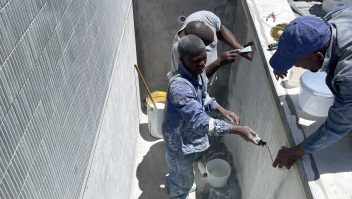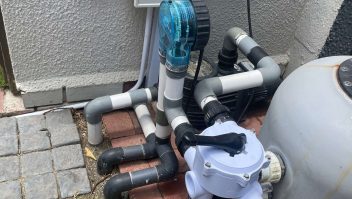If you own a pool or swim regularly in public pools around Cape Town, you’ve probably wondered: How safe is this water really? From chemical exposure to waterborne diseases, swimming pool health is a serious topic. This detailed post covers what makes a pool unhealthy, how to know if your water is safe, and what type of pool is healthiest — with insights tailored to homeowners, guests, and commercial pool operators in South Africa.
Poor Pool Maintenance Can Make You Sick
A neglected pool can quickly become a breeding ground for bacteria, viruses, and parasites:
- Low chlorine levels allow dangerous microbes to thrive.
- When water becomes stagnant, infection risks rise.
- Imbalanced pH levels can irritate skin and eyes.
- Furthermore, algae, debris, and biofilm accumulate without routine cleaning.
Additionally, cracked pool shells, dirty filters, and poorly maintained plumbing can worsen these conditions.
👉 Professional pool services in Cape Town from Pools Reno can keep your water balanced and hazard-free.
Choose These Pool Types for Better Health
Certain pool systems are easier to maintain and offer better protection for swimmers. Consider these top choices:
Saltwater Pools
- Gentle on skin and eyes
- Automatically sanitises using salt chlorinators
- Ideal for Cape Town homes with sensitive swimmers
Fibreglass Pools
- Algae-resistant non-porous surface
- Requires fewer chemicals
- Quick to install and easy to maintain
UV/Ozone Sanitised Pools
- Reduces reliance on chlorine
- Offers cleaner, clearer water with minimal effort
Explore fibreglass pool relining services to refresh an older pool.
Daily Swimming in Chlorinated Pools Can Be Safe
Swimming in a properly treated chlorine pool on a daily basis poses little risk. Consistently maintained chemical levels ensure the water remains clean and sanitised. However, fluctuating levels can cause issues like skin dryness, red eyes, and damage to swimwear fabrics.
To reduce irritation, be sure to rinse off both before and after your swim. Moreover, applying moisturiser and wearing goggles helps protect your skin and eyes. Developing these habits enhances comfort and contributes to a more enjoyable swimming routine.
Need help with water testing? Schedule a chemical balancing service.
These Are the Hidden Hazards in Your Pool
Even the clearest water may hide real dangers:
- Drowning, especially among children
- Slipping hazards on wet decking
- Electrical faults from outdated or DIY wiring
- Faulty drains or suction fittings
- Bacterial infections due to poor sanitation
To reduce these risks, consider installing safety upgrades like fences, anti-entrapment covers, and non-slip tiles. As a result, your pool becomes not only safer but also more compliant with modern regulations.
These Waterborne Diseases Can Ruin Your Summer
Contaminated pools can spread illnesses such as:
- Cryptosporidium – causes severe diarrhoea and resists chlorine
- Giardia – a common protozoa found in untreated water
- E. coli – transmitted via faecal matter
- Pseudomonas – leads to ear or skin infections
- Legionella – thrives in hot tubs and neglected pools
Pools Reno’s sanitisation services help reduce infection risks year-round. So, whether you’re a homeowner or commercial operator, expert care matters.
Public Pools in South Africa Need Daily Cleaning
To remain compliant with health regulations, public swimming pools must be cleaned regularly:
- Skim and vacuum daily during peak periods
- Test chemical levels twice daily
- Deep clean walls and floors weekly
- Backwash and inspect filters monthly
By following these practices, you ensure swimmer safety and prevent costly closures due to health code violations.
Use These Signs to Judge a Safe Swimming Pool
Before diving in, check the following indicators:
- Water is crystal clear and bottom is easily visible
- No sharp or foul chlorine odour present
- Walls and floors feel smooth and clean
- Pumps and jets actively circulate water
- Safety equipment is clearly visible and in working order
Moreover, using DIY test strips to check chlorine and pH levels offers added peace of mind. Not only is this a quick solution, but it’s also highly cost-effective.
Drowning Remains the #1 Pool Danger
Among all swimming risks, drowning remains the most serious and preventable. In South Africa:
- A child can drown silently in just 30 seconds
- Incidents often occur even in shallow water
To enhance safety:
- Install pool safety fences and self-latching gates
- Use approved covers and alarms
- Never leave children unattended — even momentarily
Let Pools Reno assist with safety cover installations in Cape Town and surrounding areas.
Looking for an Affordable Pool Option?
Pool costs vary based on material and design. Here’s a simplified comparison:
| Pool Type | Avg. Cost (ZAR) | Benefits | Drawbacks |
|---|---|---|---|
| Vinyl Liner | R80,000 – R130,000 | Cheapest upfront | Short lifespan (5–10 yrs) |
| Fibreglass | R120,000 – R200,000 | Easy to maintain, fast install | Limited shapes/designs |
| Concrete | R150,000 – R300,000+ | Custom shapes & finishes | Costly upkeep, prone to cracks |
Read more about pool installation costs in Cape Town.
FAQs: Pool Health, Safety and Upgrades
Is it possible to get sick from swimming?
Yes, particularly when chemical levels are off or circulation is poor.
Are saltwater pools safer?
They’re easier on your body and deliver consistent sanitation.
How often should pool water be tested?
Ideally, test twice a week in summer and at least once weekly in winter.
Can you upgrade a pool for better safety?
Absolutely. Pool relining, fencing, alarms, and lighting upgrades all help improve safety.
Where can I find a reliable pool safety expert in Cape Town?
Pools Reno offers inspections and renovations across the Western Cape.
Ready to Make Your Pool Safer and Healthier?
Contact Pools Reno for professional help with repairs, installations, and health inspections.
Proudly serving Cape Town, Bellville, Durbanville, Somerset West & more.



